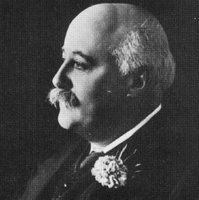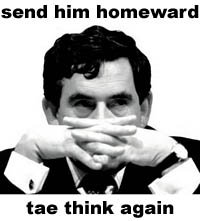I passed up the opportunity to blog on the details of Gordon Brown's constitutional reform proposals this week because I wanted to save it for my weekend columns (for which I get paid!) Anyway here is my preliminary verdict, as published in this morning's Newcastle
Journal. Some of it may be of particular interest to readers of Anglospheric tendencies.
***
During the course of the long debate over whether the North-East should have an elected assembly, one of the most oft-heard criticisms of the idea was that “it isn’t what they’re talking about down the Dog and Duck.”
If the truth be told, it wasn’t, as the November 2004 referendum result seemed to demonstrate.
Today, you can hear the same arguments being made about the wider constitutional reform agenda – that it isn’t a subject uppermost in people’s minds, that it “butters no parsnips” as Tony Blair rather unkindly put it.
Maybe so, but one issue they are certainly talking about down the mythical Dog and Duck is trust in politicians - or rather the lack of it.
So it is against that backdrop that Gordon Brown’s decision to make constitutional reform the subject of his first Commons’ statement as Prime Minister on Tuesday has to be seen.
It was always likely that Mr Brown's first big political initiative as premier would be designed to tackle the "trust" issue, for the simple reason that it was fundamentally this that forced his predecessor out before his time.
By handing over power to Parliament, and ultimately the people, Mr Brown thinks he can restore the public’s confidence in Labour after the spin and sleaze of the Blair years.
So the underlying message on Tuesday was not so much "I am a political anorak who sits up at night worrying about how to change our system of government," but simply "I am not like Tony Blair."
Mr Blair, of course, never had any time for constitutional matters. The Scottish and Welsh devolution agenda was the legacy of John Smith, and Mr Blair had little alternative but to implement it.
English regional government was an anathema to him and he actively sought to hobble the project by refusing to grant the proposed assembly anything like enough power.
Meanwhile House of Lords reform was left unfinished, and the House of Commons largely marginalised during his ten years in office.
And far from giving away powers as Mr Brown is now attempting to do, he positively revelled in the exercise of them, from waging war to appointing Church of England bishops.
The most predictable element of Mr Brown’s statement on Tuesday was that the power to declare war would be handed to Parliament – but in effect, this change has already taken place.
After the last time, if Mr Brown were now to try to wage war without a vote in the Commons, there would undoubtedly be rioting in the streets.
Potentially much more significant, in my view, is Mr Brown’s proposal to give up the right to recommend a dissolution of Parliament – namely, to decide when a general election should be held.
In a majority government situation, it is unlikely to mean much. But in a hung Parliament, it could dramatically limit a Prime Minister’s room for manoeuvre.
Among the other main proposals, moving election days from Thursdays to the weekend and lowering the voting age to 16 may or may not boost the percentage turnout that has steadily declining since 1992.
A more interesting way forward here might have been to announce a further pilot project on electronic voting, or, God forbid, reform of the electoral system itself.
But on the plus side, holding US-style hearings on key public appointments like the Governorship of the Bank of England is surely an idea whose time has come.
And by giving up the power to appoint bishops, Mr Brown has moved to address one of those peculiar British anachronisms that somehow seem to survive all attempts at modernisation.
For me, though, the most disappointing aspect of the package was the rather dismissive air that the new Prime Minister adopted towards the plight of four fifths of the UK population – the English.
Mr Brown was right to say that the Tory proposal of “English votes for English laws” makes little sense, but neither does the current status quo of Scottish votes for English laws.
An English Constitutional Convention to examine ways of tackling the English democratic deficit is the obvious way forward, and it is disappointing that Mr Brown hasn’t established one.
He did announce the creation of Commons select committees for each of the English regions – but if he sees this as the way of rebalancing the constitution in the wake of Scottish and Welsh devolution, he is in for a rude shock.
Don’t get me wrong – the committees are a positive step, and together with the dedicated regional ministers, should ensure that issues of regional importance are taken more account of at Westminster.
But essentially, they are a means of helping to address regional economic inequalities, no more.
What they are emphatically not is an answer to the so-called West Lothian Question – namely why do Scottish and Welsh MPs still have a say over English-only issues when the reverse is no longer the case?
And I cannot help worrying that Mr Brown is getting into regionalism at just such a time as people are starting to think less about regional identity and more about Englishness.
What, briefly, of the rest of the week’s events? Well, Health Secretary Alan Johnson’s announcement of a moratorium on further NHS restructures will certainly help restore staff morale.
And giving local people in cities like Newcastle and Sunderland more say over council budgets is further proof of the new government’s determination to devolve power.
Attention over the past couple of days has focused on Mr Brown’s rather lacklustre performance at his first Prime Minister’s Questions on Wednesday - but that was never going to be his strength.
Launching a serious and policy-rich agenda was. And on that score, he is so far delivering.








